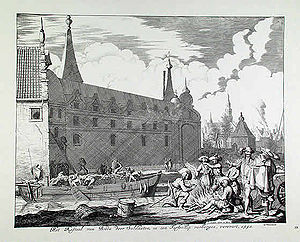
Jan Luyken
Encyclopedia
Johannes or Jan Luyken (April 16, 1649, Amsterdam
- April 5, 1712, Amsterdam) was a Dutch poet, illustrator and engraver
.
 He was born in Amsterdam and learned engraving from his father Kaspar Luyken. He married at 19 and had several children, of who Kasparus Luiken also became a renowned engraver. In his twenty-sixth year, he had a religious experience that inspired him to write moralistic poetry.
He was born in Amsterdam and learned engraving from his father Kaspar Luyken. He married at 19 and had several children, of who Kasparus Luiken also became a renowned engraver. In his twenty-sixth year, he had a religious experience that inspired him to write moralistic poetry.
with 104 copper etching
s. Thirty of these plates survive and are part of The Mirror of the Martyrs exhibit.
He also published Het Menselyk Bedryf ("The Book of Trades") in 1694, which contains numerous engravings, by Luiken and his son Caspar (Caspaares), of 17th century trades.
Amsterdam
Amsterdam is the largest city and the capital of the Netherlands. The current position of Amsterdam as capital city of the Kingdom of the Netherlands is governed by the constitution of August 24, 1815 and its successors. Amsterdam has a population of 783,364 within city limits, an urban population...
- April 5, 1712, Amsterdam) was a Dutch poet, illustrator and engraver
Engraving
Engraving is the practice of incising a design on to a hard, usually flat surface, by cutting grooves into it. The result may be a decorated object in itself, as when silver, gold, steel, or glass are engraved, or may provide an intaglio printing plate, of copper or another metal, for printing...
.
Biography

Works
He illustrated the 1685 edition of the Martyrs MirrorMartyrs Mirror
The Martyrs Mirror or The Bloody Theater, first published in 1660 in Dutch by Thieleman J. van Braght, documents the stories and testimonies of Christian martyrs, especially Anabaptists...
with 104 copper etching
Etching
Etching is the process of using strong acid or mordant to cut into the unprotected parts of a metal surface to create a design in intaglio in the metal...
s. Thirty of these plates survive and are part of The Mirror of the Martyrs exhibit.
He also published Het Menselyk Bedryf ("The Book of Trades") in 1694, which contains numerous engravings, by Luiken and his son Caspar (Caspaares), of 17th century trades.

